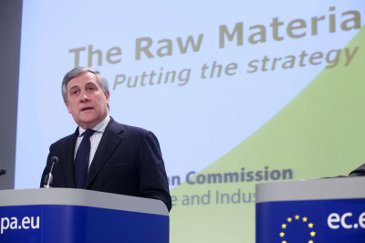Industry and Entrepreneurship
Raw materials
Raw materials matter

Raw materials are the basis of industry. No manufacturer can remain competitive without fair access to the fundamental elements which make up their final products. Europe has been at the helm of the industrial revolution and remains a top industrial power, but sits on limited deposits of raw materials. To maintain Europe's industrial competitiveness it is therefore necessary to guarantee supplies of a wide range of raw materials from third countries.
Nickel batteries, a core component of mobile phones, laptops and hybrid cars, need lanthanum, one of a list of 17 rare earths of which Europe has extremely little. Medical devices and optical equipment require tantalum, a metal found only in Brazil and Australia. To date, 14 materials are considered critical as they are crucial for EU industry, but are lacking here and also difficult to access in foreign markets.
"Although no country in the world has all the raw materials it needs, Europe is particularly vulnerable because it depends on imports of many important raw materials. This is why seeking alliances and co-operating with other countries has become a key element of the European raw materials strategy. To make it successful is crucial that the Commission and the Member States act together and move in the same direction".
The list may get longer as raw material markets are increasingly distorted by protectionist trade policies such as export taxes, import duties, price-fixing, and restrictive investment rules. For example, in 2012 the EU filed a complaint at the World Trade Organisation against China over its restrictions on exports of rare earths. Global demand for raw materials is also increasing, resulting in increased prices.
Against this background, what is needed is a 'Raw Materials Diplomacy' based on a comprehensive approach with our global partners which uses trade, development and access to raw materials as part of the negotiation toolbox. As we open up our European market - the biggest in the world - to foreign competition, in exchange we should also be resolute in our aim to access foreign resources, under fair conditions.
Dialogues are currently underway on access to raw materials with a wide variety of partners including Argentina, China, Greenland, Japan, Mexico, Russia and the United States of America. It is now important to turn these dialogues into a basis for definitive agreements.
Cooperation with Greenland
In particular, we wish to intensify cooperation with Greenland to benefit both sides, using joint infrastructures and investments or capacity building in exploration and exploitation of raw materials. On behalf of the European Commission, I signed a letter of intent on cooperation in this area on June 2012 in Nuuk. My cosignatories were the EU Commissioner for Development Co-operation Andris Piebalgs and Prime Minister Kuupik Kleist of Greenland. Currently about 58% of exploration companies operating in Greenland are Canadian or Australian companies. EU companies’ operating share in Greenland is only 15% (generated by Denmark, Germany, Czech Republic and United Kingdom). Although Europe companies hold three of the four exploitation licences in Greenland, European companies have a low involvement in on-going exploration activities and own only a few exploration licences (mostly owned by UK, Germany and Denmark).
Access to raw materials: Establishing a preferential relationship with Africa
At the Fourth AU-EU College-to-College meeting on 8th of June 2010 in Addis Ababa, I discussed importance aspects in the relationship between the two continents: a sustainable policy to improve access to raw materials and opportunities to foster regional integration and infrastructure, particularly in relation to space applications.
With regard to access to raw materials, the African Union Commission (AUC) and the European Commission have agreed to work together on governance, infrastructure and geological knowledge and skills.
In January 2012 a High-Level Conference on the EU-Africa Partnership on Raw Materials - Translating Mineral Resource Wealth into Real Development for Africa took place in Brussels.
In its Raw Materials Initiative (RMI) the Commission committed to continue to assess – in conjunction with African countries – the feasibility of assisting further co-operation between both continents' geological surveys and to promote related co-operation in multilateral fora such as UNESCO's Geosciences Programme.
A scoping study on this subject should start in 2013. It aims to establish joint projects to improve knowledge about African deposits, set up a network for delivery of training to the African surveys, and exchange and digitalise data.
European geological surveys have a crucial role to play in this process.
Increasing Europe’s own raw material production
It is also important to improve the sustainability of mining projects within Europe. It is important to improve Europe’s raw materials regulatory framework in order to ensure a stable and competitive supply of raw materials from EU sources. Furthermore, since our resources are limited, we must make the most of our technological opportunities, while at the same time maintaining our mining industry’s sustainability.
It has been estimated that the value of unexploited European mineral resources at a depth of 500-1,000 metres is about € 100 billion. This is why a European Innovation Partnership on raw materials has been set up by the Commission to increasing Europe's own production. It pulls together capital and human resources, Member States, companies and researchers in joint innovation efforts to support the exploration, extraction and processing of raw materials. New technologies will help with deeper extraction, in more remote areas and under harsher conditions. Action is also needed to develop substitutes for critical raw materials and to improve the recycling of the 17 kg electric and electronic equipment waste that each EU citizen produces annually today.

